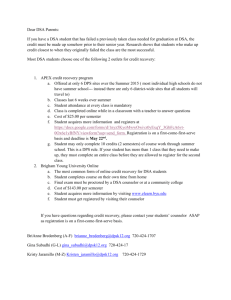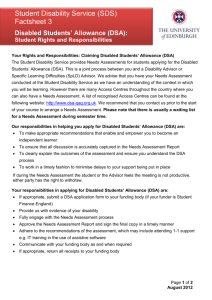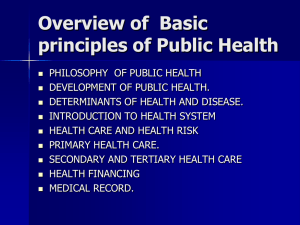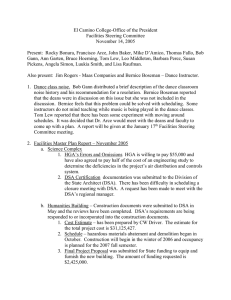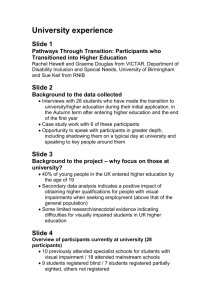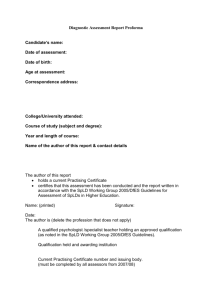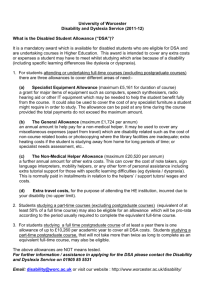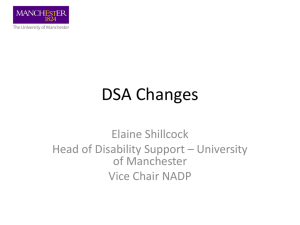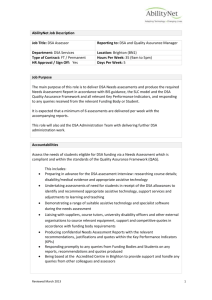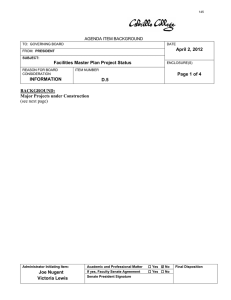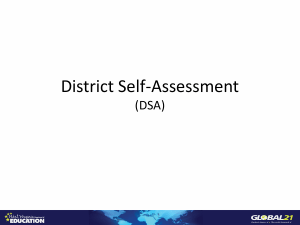Ian Litterick - The Latest DSA Developments
advertisement
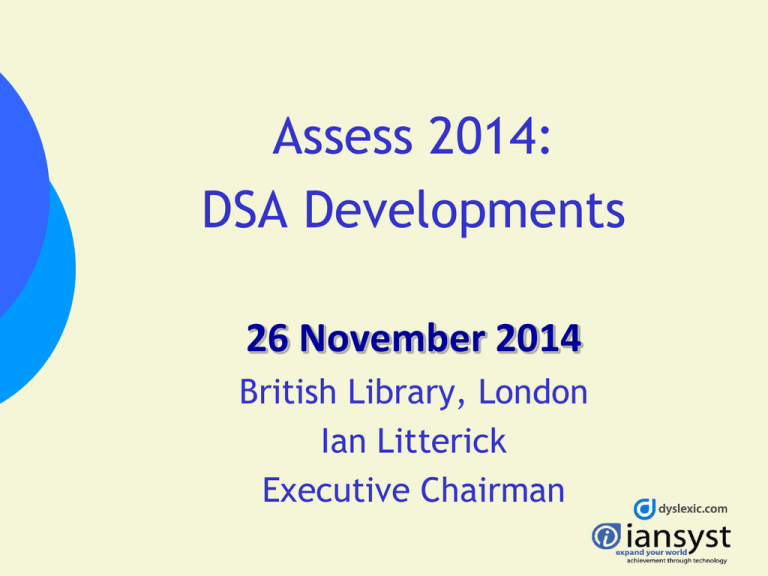
Assess 2014: DSA Developments 26 November 2014 British Library, London Ian Litterick Executive Chairman Where we started: April 7th “25 years without review” “modernisation” “Rebalancing” – HEI’s to be more inclusive, responsible for reasonable adjustments; Transfer of students with “simple dyslexia”; No longer pay for: “standard computer”; computer needed for course (eg Mac); most NMH (“most specialist” only); Equality Act Definition. Equality Act 2010 Definition: A person has a disability for the purposes of the Act if he or she has a physical or mental impairment and the impairment has a substantial and long term adverse effect on his or her ability to carry out normal day to day activities Actually in effect now; Still uncertainty over SpLD??; Learning is a day to day activity. What we thought: Equipment grant going from £46m 2011/12 (“peak oil”) To c £27m 2013-14 (40% drop) To c £2.5m 2015-16 (90% further drop); ie computer only funded for VI and mobility issues; Otherwise mainly software; And then only “complex” dyslexia. What happened: Stakeholder revolt; Westminster Hall debate, Julian Huppert; A lot of consultation/information; Greg Clark replaces David Willetts; Clarification of SpLD funding for “complex support needs” (only)(?); All students to have NA (even if no further DSA provision). Sept 12 Minister’s update NMH changes deferred 1 year; Computer stays for 2015/16; Student contributes £200 to computer; Not “automatically provide” printers and consumables; “explore bulk purchase” for computers; Consider “Streamlining” the assessment process What we have achieved(?) Continuing provision of AT “standard computer”; Acknowledgement that AT requires more than basic high street “standard computer”; Continuing payment for insurance, maintenance and support; ie BIS recognise the value of the “one-stopshop” and course-long support to allow disabled students to minimise the burden of overcoming their disability; Abandoning of simple v complex needs?? 2015-16 BIS expect 20-25,000 computers (not very different); So £20m + spend? What will be the deterrent effect of £200 on DSA claims? Are they intending to keep computer funding centrally (rather than HEIs for “simple” SpLD needs)? (Draft) guidance document and disability impact assessment. 2015-16 (Draft) Guidance: Individual scanners and printers will no longer be provided other than in limited circumstances; Books All down to the institution – accessible and digital. Therefore HEIs to provide electronic documents and scanning – BY SEPT 2015 – documented by March???; Library services for printing and scanning; DSA will fund: Standard Computer (WKH) (-£200) Assistive Software . . . should not recommend a standard computer unless it is essential and full justification will be required in each case. . . . must not recommend a standard computer where an entry-level computer will meet the needs of the student. where individual access to that technology is essential for the student and a reasonable adjustment cannot be made by the institution to meet the student’s needs. Ergonomic furniture that is required for study at home (otherwise for HEI). “Limited circumstances only”: DVR, mics, recording pen: Handheld electronic spellchecker (Exceptional Circumstances Process); “no longer generally provided” (?!) “an entry-level computer will provide the same functionality” Standard computer peripherals (ergonomic) (ECP) Solely due to the student’s disability; “DSA assessors should identify the cheapest available computer that meets the student’s needs” ??? (Also for standard computers) Tablet computers (ECP) specialist keyboards and mice, wheeled laptop bags, wrist rests, foot rests and neck rests. High cost computers/ low weight computers “fulfilled by assistive software on a computer, or on a smart phone”; Ergonomic equipment “whether lecture capture facilities have been put in place” (for every teaching event that might need to be recorded???) standard keyboards, standard size monitors (up to 15”) and mice Large or specialist monitors Never: Entry-level computer (no AT); USB hub / laptop carry cases / extension leads / surge protectors / computer stand/risers; Course Specific Software; (ergonomics? RSI?) (disability reasons?) Wheelchairs / mobility scooters Internet Connection (but ECP) Others: Additional costs of specialist accommodation: Not if HEI or Local Authority Care plan; Consumables (limited circumstances): [no printers] . . . will therefore no longer be provided for personal equipment; “Exceptions will be considered under the Exceptional Case Process” “a formal process for dealing with them will be put in place [details to be confirmed in due course and flowchart]”. worryingly laborious and will inevitably add to delays for students who, by definition, are exceptional cases. It is really important that this process be simple and time limited. There should be a threshold value for an ultra-simple process (say £50), or SLC will be paying much more on the process than the potential savings/costs. Appeals to the OIA Office of the Independent Adjudicator But Disability Rights UK concerns: time legal resources and free advice there being a guarantee that HEIs will have regulations requiring them to comply not just with their own procedures (as at present – see OIA rule 6.4) but with the policy Appendices: B: Examples of reasonable adjustments in HE; C: New NAR structure £200 contribution: 48% of DSA claimants get full grant; 60% some grant; What if they can’t pay? Last straw for DSA hassle? Bradford laptop Top Up grant from ALF (if on full grant) (but by April 2015??) Will this be the norm? It’s a draft: 1 comment is ignorable; 2 is a mass movement? 2016+ Bulk Purchasing; Streamlining; Tender for the whole of DSA Equipment? Open Source and “free” software? End for ATSPs and AT industry? End DSA as a “Beacon of Excellence” in AT provision; Standard solution for dyslexia? Trial software system? End for assessors? Exploring support for computer not supplied by ATSPs. A single tender would: Serve students less well; Kill the UK AT industry, its SMEs and Assistive Technology innovation; Reduce future AT exports; Remove AT expertise and future competition; Risk tender failure pre award because it is too complex Be challenged for transparency, equal treatment and nondiscrimination. Fail to meet its timeline, and so need saving by existing ATSPs. Risk tender failure post award through under-bidding, overpromising; Risk raising costs, whether initially or later; Remove any vestige of personal choice; Risk making the government even more dependent on its usual limited range of large outsourcing providers – who have a history of failing; Ossify provision with old, lower functioning, stigmatising equipment; If it works, don’t fix it. Government Regulatory Reform agenda: Contrast the DSA! QAG and QAFs; Ever tighter guidance; NAR. References: https://www.gov.uk/government/speeches/higher-educationstudent-support-changes-to-disabled-students-allowances-dsa (7 April) http://www.parliament.uk/documents/commons-voteoffice/September%202014/12%20September/2-BISStudentSupport.pdf (12 Sept) http://www.practitioners.slc.co.uk/media/847636/guidance_docume nt_-_second_draft_for_publication_16.10.2014.doc (Guidance 2015-6) http://www.legislation.gov.uk/uksi/2014/2765/pdfs/uksi_20142765_ en.pdf (2014 (Regulations: Statutory Instrument) https://www.gov.uk/government/uploads/system/uploads/attachme nt_data/file/364182/bis-14-1108-higher-education-disabled-studentsallowances-equality-analysis.pdf (Equality Analysis) https://www.bradfordcollege.ac.uk/sites/default/files/shared/Bradf ord%20College%20-%20ALF%20-%20DSA%20-%20Computer%20top-up.pdf (Bradford £200 top-up a/f) disabledstudentsallowances@bis.gsi.gov.uk Feedback please! Ian Litterick Executive Chairman ian@iansyst.co.uk 01223 436680 07860 926159
